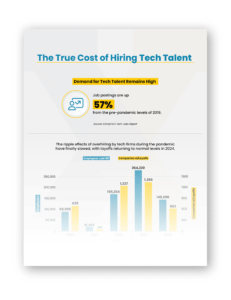Successful outsourcing starts with a thoughtfully designed IT managed services onboarding process, setting the tone for your ongoing relationship with your managed services provider (MSP). Poor onboarding often triggers a mismatch between customer expectations and experience – impacting long-term value, satisfaction, and trust.
Some 46% of customers say they are likely to increase their investment after successful onboarding experiences. And about half say they are likely to walk away without the right initial support.
When outsourcing relationships fail, the problem isn’t the concept – thousands of businesses have reaped immense rewards from IT outsourcing for decades. In fact, managed services spending is expected to account for a record 18% of IT budgets in 2023.
When outsourcing goes wrong, execution typically holds the blame – and proper execution starts with a repeatable IT managed services onboarding process that gets both sides up to speed, addresses concerns, and outlines the strategy going forward so everyone begins on the same page.
However, every onboarding process is not created equal. Here’s what many outsourcers do wrong – and what to expect from MSPs who get it right.
IT managed services onboarding process: 6 common pain points
- Inadequate understanding of project scope. Setting the right expectations is vital to a successful IT managed services onboarding process. Many MSPs fail to clearly define what falls in and outside scope, frustrating customers who expect work the outsourcer doesn’t consider part of the project.
- Poor communication. The outsourcing industry is littered with providers who deliver a “black box” approach, offering little visibility into their strategy and processes. Unfortunately, that often triggers confusion and delays, as customers don’t understand what should happen, by when, and who should be involved to keep projects moving forward. Frustration also simmers when customers believe nothing is on track because they stay in the dark about schedule and activity.
- Inability to capture business-critical issues. Many MSPs are staffed with technical experts who lack business expertise. Unfortunately, outsourcing processes without fixing their underlying flaws simply replicates inefficiencies and bottlenecks. Quality outsourcers are experts at identifying business-critical issues, improving workflows, and implementing the right technology so customers better achieve enterprise goals.
- Insufficient knowledge transfer. After onboarding, MSPs should have need-to-know information at their fingertips, creating the best possible position to begin work. However, customers rarely realize all the data they need to provide to ensure a smooth transition. Outsourcers must be master interviewers – asking the right questions to draw the information they need from the business and identify inefficiencies and gaps.
- Lack of accountability. Raise a red flag if your MSP fails to implement clear standards, steps, and accountability during the IT managed services onboarding process. Exceptional partners not only ensure the delivery plan aligns with the requested service, but also demonstrate how they plan to measure results.
- Deficient training. Failing to properly train outsourced teams can trigger an avalanche of operational risks, including mistakes, inefficient task completion, and even project failure. A strong IT managed services onboarding process should leave your provider well-prepared to effectively train the people performing the work, ensuring best-in-class service.

8 key components of an IT managed services onboarding process done right
A whopping 89% of customers report friction or frustration during inadequate onboarding. Here’s what to expect from IT managed services onboarding processes that create sustainable success:
1. Proven project management methodology
Exceptional MSPs follow a proven onboarding approach, deploying a customizable set of best practices, tools, and documented processes that have been implemented successfully across hundreds of clients.
Accountability stems from a transition team exclusively focused on onboarding new customers, maintaining momentum, and ensuring each phase is completed properly before operations begin work.
Look for key steps that include:
- A project plan detailing how the outsourcer plans to prepare its teams and align with expected services.
- Dashboards offering visibility into onboarding progress.
- Thorough data gathering.
- Tracking tools that clearly indicate ownership of each activity and delivery deadlines.
2. Robust communication strategy
Quality partners use the IT managed services onboarding process to demonstrate their expertise, communicate a clear plan of action, and build strong relationships with customers.
A solid communication plan outlines onboarding objectives, frequently delivering key messages about transition status, accomplishments, and risks.
Communication tools like Microsoft Teams facilitate easy interaction between internal and onboarding teams. Your MSP should help you choose the ideal solution for your business.
3. Transparent transition timeline
Onboarding timelines establish transparency that help avoid miscommunication and surprises. The timeline should detail project phases, keeping customers informed about current activity and expected completion.
4. Clear project scope
A major source of customer friction stems from a lack of clarity in the project scope. To eliminate ambiguity, your MSP should present a detailed In-Scope Services Landscape and Service Catalog for approval during onboarding. They should also provide Service Level Agreements (SLAs) for measuring results.
Exceptional outsourcers honor the “spirit of the agreement,” ensuring customers receive promised results without nickel and diming them over services. Discussing questions and concerns before the project begins eliminates gaps between client expectations and what that means.
5. Exit criteria
Quality outsourcers foster customer satisfaction by clearly defining actions that need to occur before onboarding is completed. Exit criteria should be delivered for each phase, as well as the entire process.
6. Tracking tools for enhancing client data collection
Applying tracking tools like Smartsheet to the data-gathering process prevents important information from slipping through the cracks. For instance, MSPs can use Smartsheet to track end-to-end onboarding for the complete list of client servers it plans to support.
The tool ensures key stakeholders understand the information they need to collect to support the process, as well as customer contacts. It can also send automated reminders that help ensure deadlines are met.
7. Defined support
Defining a support model is a critical onboarding process, establishing proper governance, policies, and controls to enable successful outsourcing operations. Quality MSPs use onboarding to define how operations will work, ensuring support teams have everything they need to prepare operations for project launch.
8. Feedback and reviews
Exceptional outsourcers seek customer feedback. Not only do they understand that feedback enables continuous improvement, but it also sheds light on onboarded components that require tweaking.
Feel confident you made the right MSP choice
Too many MSPs treat onboarding as a time to check a few boxes – instead of an opportunity to establish best practices, start relationships on the right foot, and ensure everything is in place to launch a successful project.
After a robust IT managed services onboarding process, you should feel confident you made the right choice – and that your outsourcing partner can fulfill your needs with excellence.
Want to learn more about decreasing costs and increasing productivity through IT managed services? Schedule a free consultation today!




